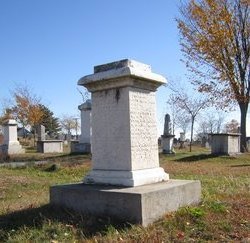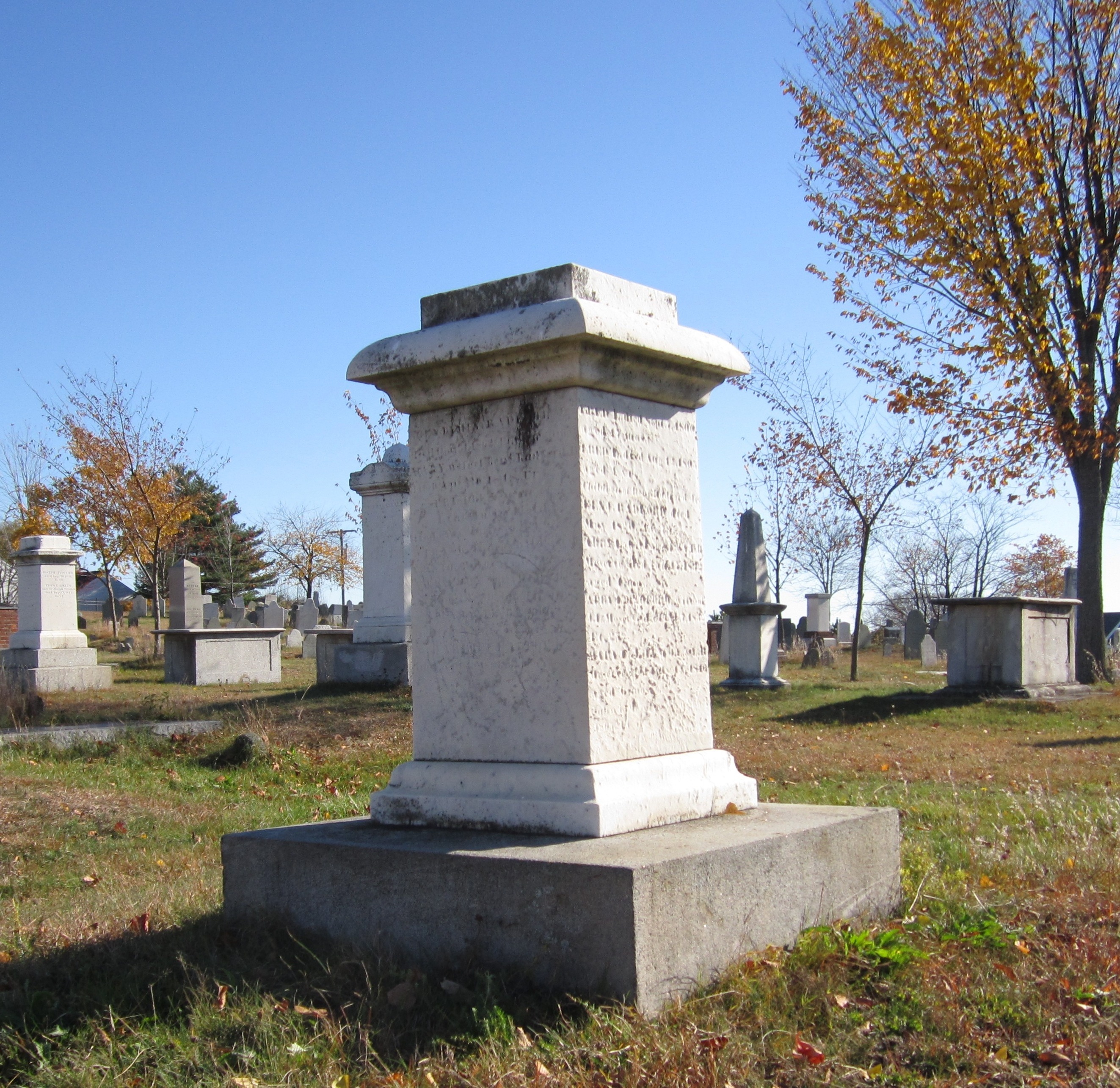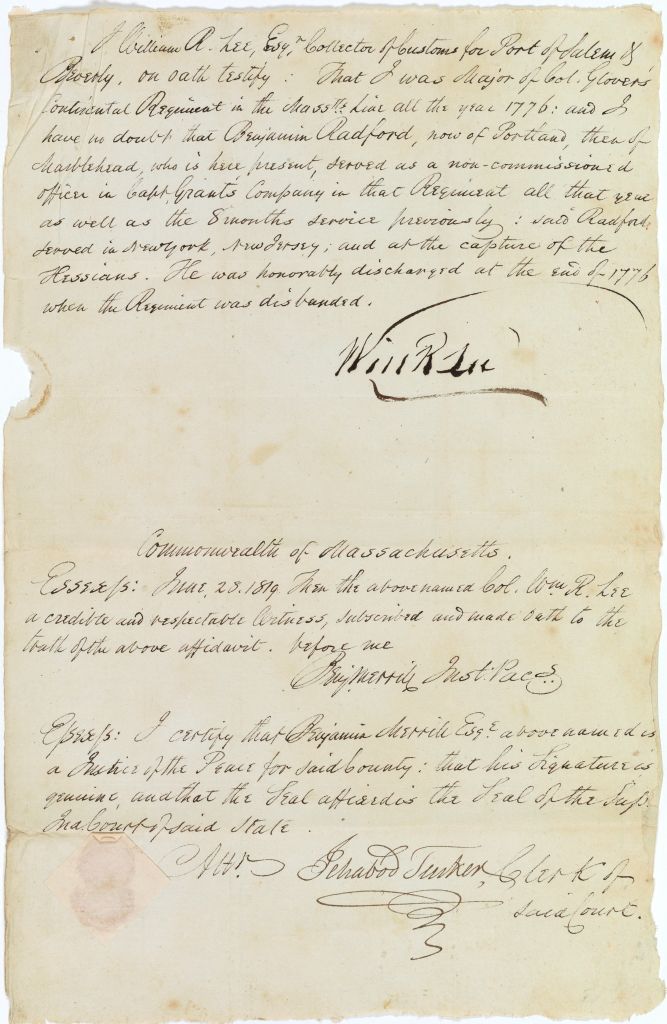Benjamin Radford's service in the Revolutionary War is verified by a letter in his pension file from one of his commanding officers. It reads as follows:
"I, William R. Lee, Esquire, Collector of Customs for the Port of Salem and Beverly, on oath testify that I was a Major of Colonel Glover's Continental Regiment in the Massachusetts line all the year 1776; and I have no doubt that Benjamin Radford, now of Portland, then of Marblehead, who is here present (June 28, 1819), served as a non-commissioned officer in Captain Grant's Company in that Regiment all that year as well as the 8 months previous; said Radford served in New York, New Jersey, and at the capture of the Hessians."
The "Capture of the Hessians" refers to General George Washington's landmark victory on December 26, 1776, at Trenton, New Jersey. At the time Washington's army was on the verge of defeat. Morale was low and the war was all but lost. Making matters worse, enlistments for many of Washington's regiments were soon to expire. From his camp on the west bank of the Delaware River, Washington decided to make a bold move that would ultimately turn the tide of the Revolutionary War. He devised a plan to launch a surprise attack on the Hessian garrison at Trenton, and selected Colonel John Glover and his 14th Regiment from Marblehead, Massachusetts, to ferry the Continental Army across the Delaware. Washington ordered the operation for Christmas night, which turned out to be a howling snow storm. In spite of treacherous conditions, Glover's men prevailed and ferried the heavily laden boats across the river setting the stage for victory at Trenton. Before the day was out, Glover's Regiment would play a key role in the successful attack on Trenton and then lead the return trip back across the Delaware for Washington's army and approximately 900 Hessian prisoners.
General Henry Knox, who was one of Washington's key officers during the battle of Trenton, recalled the event years later before Massachusetts legislature: "I wish you had stood on the Delaware River in 1776 on that bitter night … I wish you could have heard the commander-in-chief demand, 'Who will lead us on?' and seen the men of Marblehead, and Marblehead alone, stand forward to lead the army along the perilous paths to unfading glories and honors in the achievements of Trenton. There went the fishermen of Marblehead, alike at home upon land or water, alike ardent, patriotic and unflinching, wherever they unfurled the flag of their country."
After his surrender in 1781 at Yorktown, British General Charles Cornwallis paid tribute to George Washington and his victory at Trenton five years earlier. Responding to a traditional toast, he said, "When the illustrious part that your Excellency has borne in this long and arduous contest becomes a matter of history, fame will gather your brightest laurels rather from the banks of the Delaware than from those of the Chesapeake."
Writing about the American victory at Trenton, British historian Sir George Otto Trevelyan, said: "It may be doubted whether so small a number of men ever employed so short a space of time with greater and more lasting effects upon the history of the world."
Benjamin Radford's service in the Revolutionary War is verified by a letter in his pension file from one of his commanding officers. It reads as follows:
"I, William R. Lee, Esquire, Collector of Customs for the Port of Salem and Beverly, on oath testify that I was a Major of Colonel Glover's Continental Regiment in the Massachusetts line all the year 1776; and I have no doubt that Benjamin Radford, now of Portland, then of Marblehead, who is here present (June 28, 1819), served as a non-commissioned officer in Captain Grant's Company in that Regiment all that year as well as the 8 months previous; said Radford served in New York, New Jersey, and at the capture of the Hessians."
The "Capture of the Hessians" refers to General George Washington's landmark victory on December 26, 1776, at Trenton, New Jersey. At the time Washington's army was on the verge of defeat. Morale was low and the war was all but lost. Making matters worse, enlistments for many of Washington's regiments were soon to expire. From his camp on the west bank of the Delaware River, Washington decided to make a bold move that would ultimately turn the tide of the Revolutionary War. He devised a plan to launch a surprise attack on the Hessian garrison at Trenton, and selected Colonel John Glover and his 14th Regiment from Marblehead, Massachusetts, to ferry the Continental Army across the Delaware. Washington ordered the operation for Christmas night, which turned out to be a howling snow storm. In spite of treacherous conditions, Glover's men prevailed and ferried the heavily laden boats across the river setting the stage for victory at Trenton. Before the day was out, Glover's Regiment would play a key role in the successful attack on Trenton and then lead the return trip back across the Delaware for Washington's army and approximately 900 Hessian prisoners.
General Henry Knox, who was one of Washington's key officers during the battle of Trenton, recalled the event years later before Massachusetts legislature: "I wish you had stood on the Delaware River in 1776 on that bitter night … I wish you could have heard the commander-in-chief demand, 'Who will lead us on?' and seen the men of Marblehead, and Marblehead alone, stand forward to lead the army along the perilous paths to unfading glories and honors in the achievements of Trenton. There went the fishermen of Marblehead, alike at home upon land or water, alike ardent, patriotic and unflinching, wherever they unfurled the flag of their country."
After his surrender in 1781 at Yorktown, British General Charles Cornwallis paid tribute to George Washington and his victory at Trenton five years earlier. Responding to a traditional toast, he said, "When the illustrious part that your Excellency has borne in this long and arduous contest becomes a matter of history, fame will gather your brightest laurels rather from the banks of the Delaware than from those of the Chesapeake."
Writing about the American victory at Trenton, British historian Sir George Otto Trevelyan, said: "It may be doubted whether so small a number of men ever employed so short a space of time with greater and more lasting effects upon the history of the world."
Gravesite Details
He may have been buried initially in Section B, Row 2, Grave 29 (see memorial #86411529).








